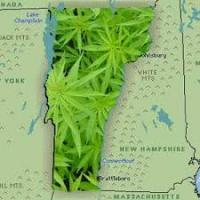
When Daryl Pillsbury and I met in March 2010 for the first time the meeting came about after I had seen a photo of him in the Reformer holding a “Legalize Marijuana” sign outside of the polling area during the March town elections. That year I was chafing from the awareness that, while Vermont was surely a significant marijuana consumer state, it was clear that a high percentage of Vermonters were caught up in the criminal justice web.The actual statistics didn’t matter to me. Two consenting Vermont adults being arrested for personal use and possession of marijuana were two too many.
If there was any noteworthy marijuana activism in Vermont at that time it was under the radar. In fact, it seemed as if there was no activism at all, which is why the photo of Daryl holding the legalize sign struck a chord with me.
In 2010, I knew the Vermont legislature was not about to legalize marijuana anytime soon. So the question then was what to do in the meantime. And, that’s why I asked a friend if she knew how I could reach Daryl.
We met for lunch in his favorite coffee shop on Canal Street in late March on a warm sunny afternoon. Once he and I got passed our agreement that ‘of course, marijuana should be legalized,’ there was only one other thing to discuss: decriminalize it. Daryl too, as a former state representative, was savvy enough to know the legislature would be slow acting on a topic like marijuana legalization. Something had to be done in the meantime to help protect marijuana consumers in Vermont. We saw decriminalization as a harm reduction measure that would have a better chance of passing in the legislature.
By April 2010 we formed Marijuana Resolve to reach out to the public to seek their help to decriminalize marijuana in the state of Vermont. That year Senator Peter Shumlin, who was president pro tem of the state senate, was a candidate for governor. Shumlin is long known to be marijuana friendly. However, as a pragmatic senator and candidate for governor he made it clear to the press that he did not support legalization. Let’s face it, he understood, as did the Marijuana Resolve staff, that no gubernatorial candidate in 2010 would win an election supporting legalization. It’s what Senator Jeanette White refers to as political compromise.
In June 2010 Daryl and I decided to call Senator Shumlin’s office to see if he would headline our forum at UVM in Burlington which included state representative Jason Lorber, Marijuana Resolve cofounder Paul Bennett and Daryl Pillsbury. It was around this time that the Marijuana Policy Project (MPP) took notice of our activities and, quite naturally, quietly went about the business of shoring up their lobbyist interests in Vermont.
On June 6, 2013, Vermont became the 17th state to decriminalize marijuana. What decriminalization did do and does now is make possession of less than an ounce and related marijuana paraphernalia punishable by fine only. It prohibits arrest and jail time for Vermont marijuana consumers for personal possession.
Thanks to decriminalization of marijuana, people possessing marijuana and paraphernalia for personal, nonmedical marijuana use are safe from the criminal justice syndrome and kept out of harm’s way…until the state assembly can do what it should have done a long time ago – legalize it.




No criminal record
I meant to add that under the current decriminalization law there is also no criminal record if one has an encounter with the police, if it is understood that the person is possessing less than an ounce for personal use.
It is the ‘no criminal record’ that is equally important as it means things like housing and employment are unaffected.